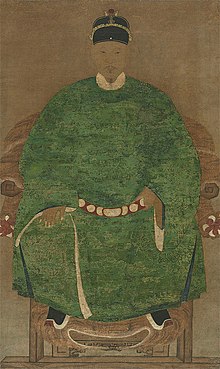| Zheng Chenggong 鄭成功 | |||||
|---|---|---|---|---|---|
 The mid-17th century painting The Portrait of Koxinga | |||||
| Prince of Yanping | |||||
| Reign | May or June 1655 – 23 June 1662 | ||||
| Predecessor | None | ||||
| Successor | Zheng Jing Zheng Xi (as Lord of Tungtu) | ||||
| Born | Zheng Sen 27 August 1624 Hirado, Hizen Province, Japan | ||||
| Died | 23 June 1662 (aged 37) Anping, Kingdom of Tungning | ||||
| Burial | Tomb of Zheng Chenggong (鄭成功墓; in present-day Nan'an, Quanzhou, Fujian) | ||||
| Spouse | Dong You, Princess Wu of Chao[1] | ||||
| Issue | Zheng Jing and nine other sons, four daughters | ||||
| |||||
| House | Koxinga | ||||
| Dynasty | Tungning | ||||
| Father | Zheng Zhilong | ||||
| Mother | Tagawa Matsu | ||||
| Koxinga | |||||||||||||||||||||
|---|---|---|---|---|---|---|---|---|---|---|---|---|---|---|---|---|---|---|---|---|---|
| Traditional Chinese | 國姓爺 | ||||||||||||||||||||
| Hokkien POJ | Kok-sèng-iâ Kok-sìⁿ-iâ | ||||||||||||||||||||
| Literal meaning | Lord of the Imperial Surname | ||||||||||||||||||||
| |||||||||||||||||||||
| Zheng Chenggong | |||||||||||||||||||||
| Traditional Chinese | 鄭成功 | ||||||||||||||||||||
| Hokkien POJ | Tīⁿ Sêng-kong | ||||||||||||||||||||
| |||||||||||||||||||||
| Zheng Sen | |||||||||||||||||||||
| Traditional Chinese | 鄭森 | ||||||||||||||||||||
| Hokkien POJ | Tīⁿ Sim | ||||||||||||||||||||
| |||||||||||||||||||||
Zheng Chenggong, Prince of Yanping (Chinese: 鄭成功; pinyin: Zhèng Chénggōng; Pe̍h-ōe-jī: Tīⁿ Sêng-kong; 27 August 1624 – 23 June 1662), better known internationally as Koxinga (Chinese: 國姓爺; pinyin: Guóxìngyé; Pe̍h-ōe-jī: Kok-sèng-iâ), was a Southern Ming general who resisted the Qing conquest of China in the 17th century, fighting them on China's southeastern coast.
In 1661, Koxinga defeated the Dutch outposts on Taiwan[2][3] and established Zheng rule of the island on behalf of Ming Dynasty from 1661 to 1683.
- ^ Wills (1974), p. 28 and Keene (1950), p. 46 both agree that Zheng's wife's surname was "Dong" (董). Clements (2004), p. 92 however, claims her name was "Deng Cuiying". Chang (1995), p. 740 introduces her as "Tung Ts'ui-ying", which would be "Dong Cuiying" in Hanyu Pinyin.
- ^ the London Times (26 November 1858). "The Pirates of the Chinese Seas". The New York Times.
- ^ Andrade (2008).